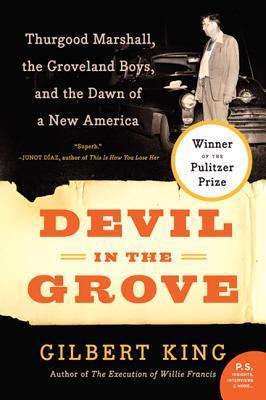More on this book
Community
Kindle Notes & Highlights
by
Gilbert King
Read between
February 23 - March 28, 2023
It wasn’t the indentation of the rope that had cut into the flesh below the dead man’s chin, or even the bullet holes riddling his body, that caused Marshall, drenched now in sweat, to stir in his sleep. It was the virtually angelic faces of the white children, all of them dressed in their Sunday clothes, as they posed, grinning and smiling, in a semicircle around Rubin Stacy’s dangling corpse. In that horrid indifference to human suffering lay the legacy of yet another generation of white children, who, in turn, would without conscience prolong the agony of an entire other race.
Marshall would later say, “There is very little truth in the old refrain that one cannot legislate equality. Laws not only provide concrete benefits, they can even change the hearts of men—some men, anyhow—for good or evil.”
Sheriff M. L. Wann
Black farmers like Henry Shepherd and his family threatened, “by their example, the whole system of servitude and forced labor which is the base of the local economy,”
YOU CAN EITHER jump into the river, or take what is in this gun.” Standing at the rock’s edge, the white man held the pistol steady and waited for the boy to make his choice. James Howard, helpless, watched his sobbing fifteen-year-old son—hands and feet bound by rope—shuffle back off the edge of the embankment, watched him plunge into the cold, deep water of the Suwannee River, where he disappeared. The lynching of Willie James Howard in January 1944 occurred more than a decade before the fourteen-year-old black youth Emmett Till was beaten and shot, and his body then dumped in a river in
...more
So long as these conditions exist in America, our democracy is little more than ‘sounding brass or a tinkling cymbal.’ ”
From 1882 to 1930, Florida recorded more lynchings of black people (266) than any other state, and from 1900 to 1930, a per capita lynching rate twice that of Mississippi, Georgia, or Louisiana.
“it is necessary to establish the principle of the indivisibility of liberty so that the masses recognize that no matter where liberty is challenged, no matter where oppression lifts its head, it becomes the business of all the masses.”
in any fight some fall.
dilatory
a Jim Crow car was being dispatched from the Dabney Funeral Home in Leesburg because the hospital ambulance could not be used to transport blacks.
“Brutal and cynical white supremacy Florida has again announced its intentions of smearing the Constitution and the Bill of Rights with the blood of a Negro,”
The sheriff’s personal reign of terror ended in 1972, when he was indicted and suspended from office by Governor Reubin Askew: the sixty-two-year-old McCall had kicked to death a mentally retarded black prisoner in his cell. Although McCall was acquitted of the charges, the time he’d spent defending himself in court had prevented him from campaigning effectively enough to win that year’s election. Still, he was only barely defeated in his bid for an eighth consecutive term.
“There is very little truth to the old refrain that one cannot legislate equality,” Marshall posited in a 1966 White House conference on civil rights. “Laws not only provide concrete benefits, they can even change the hearts of men—some men, anyhow—for good or evil.”
There is a law governing the meeting of the races. When a powerful race meets a helpless race, two things happen. First, there is a carnival of crime. Cruelty and oppression take place: some men in each race become hard-hearted. But the reverse also happens thereafter; goodness and mercy are developed; certain men become saints and heroes. —John Jay Chapman, The Negro Problem, 1915


